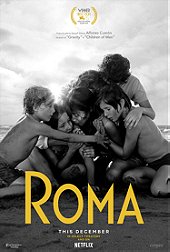Alfonso Cuarón’s Roma is a memory play and a quiet documentation of the sublime found in the banality of everyday life. I wouldn’t entirely call the ability of the film’s images to transform the mundane into the cinematic divine ‘magic realism,’ but I’m not sure what else to dub it. Cuarón’s camera is permanently seeking a way to alchemically transform something boring into something engrossing and beautiful.
Told entirely from the point-of-view of the domestic worker Cleo (Yalitza Apericio), Roma glimpses a year-in-the-life of this woman and the family she serves. Alternating between Spanish and Mixtec, Roma manages to humanize all of its primary characters, namely Cleo and her employer’s wife, Sofia (Marina de Tavira), putting our empathies and rooting interest in their relationship’s nuances and complications. These women lean on each other and Roma never judges either of them for their lifestyles and choices, however limited or dependent upon the men or more monied persons orbiting their lives.
Roma details these nuances and minute details through closeups of faces and visual storytelling. Long passages of the film are spent merely observing the day-to-day realities and tasks of its various characters with little to no dialogue. Some of these moments turn the grueling physical labor of the domestic workers into magical tableaus where the water used to clean dog shit transitions into a mirror that captures the planes flying overhead or tracks across a countryside that becomes an Eden-like place as it taps into a character’s nostalgia for home and childhood.
This was Cuarón’s passion project, and his one-man-band approach to the material marks it as his most personal and potentially autobiographical work to date. He wrote, directed, shot, and edited the entire thing, and his artistic mastery is utterly compelling and wide-ranging. The visuals he manages to capture explain so much of the dynamics at play within the material better than any verbal pyrotechnics ever could. He never tells us but shows through his slow burning poetry and shots that capture the friction between the characters or the larger situation that Cleo finds herself caught within.
It doesn’t hurt that he manages to get stunning work from his two actresses. They are Roma and Roma is them just as much as it is Cuarón’s baby. Marina de Tavira is an established actress in Mexico, so her stunning work comes as no shock beyond being a primary introduction to American audiences. Her work is subtle even when the tribulations could tip into melodrama, and she’s never more engaging then when she stumbles home drunk and calmly asserts to Cleo that women are inevitably alone in this world. Her delivery is laced with impotence and pent-up rage, with misdirected aggression and heartache.
I’m most curious about what waits in store for Yalitza Apericio as an actress going forward. Will she be one of those morning glory darlings or manage to craft a respectable career for herself? God, I hope she gets further opportunities because there’s something enthralling about merely observing her in front of the camera. Her work is a perfect example of the quiet ones being the ones you have to watch out for. Her birthing scene is extraordinary as we learn of the complications and tragedies at the same time she does, and her transition from pain to panic to emotional exhaustion is profoundly real. Her character’s dignity is written all over her mysterious smile and refusal to lie down in spite of a series of turbulent emotional experiences.
Roma’s quiet dignity and emotional tactility sucker punched me from the first gorgeous frame to the last. It slowly builds from one emotional crescendo to the next (god, that beach scene!) and it’s all an incredibly intimate affair. It’s a glimpse of an artist’s autobiography also functioning as self-critique as he examines his privileged childhood and wonders what the interior life of his family’s domestic workers was like. There’s no grand three-act structure here, instead Roma lulls you into its textures and movements through a slow burn. Your mileage may vary, but I was enthralled from the opening credits to the end.
 Login
Login